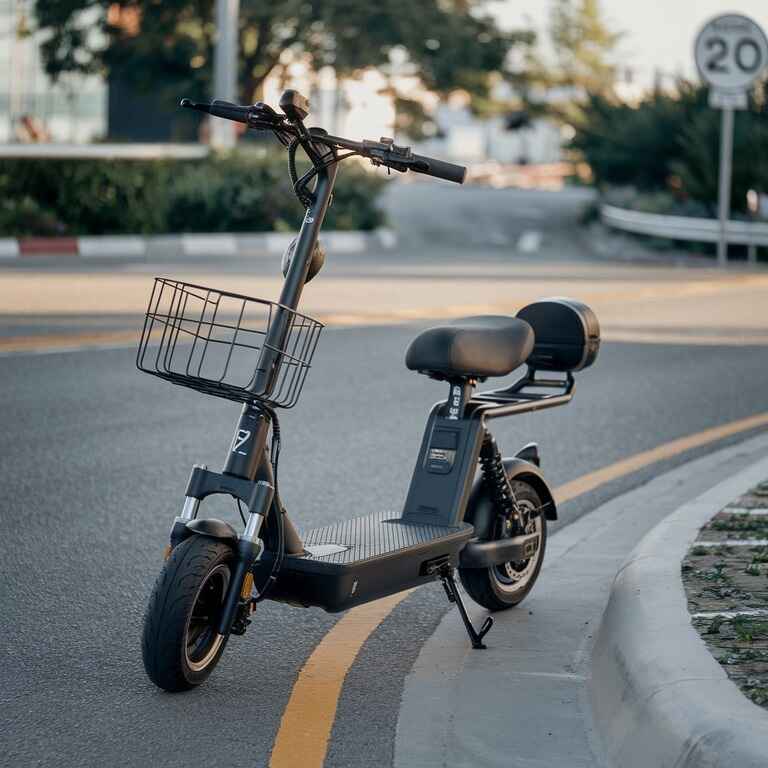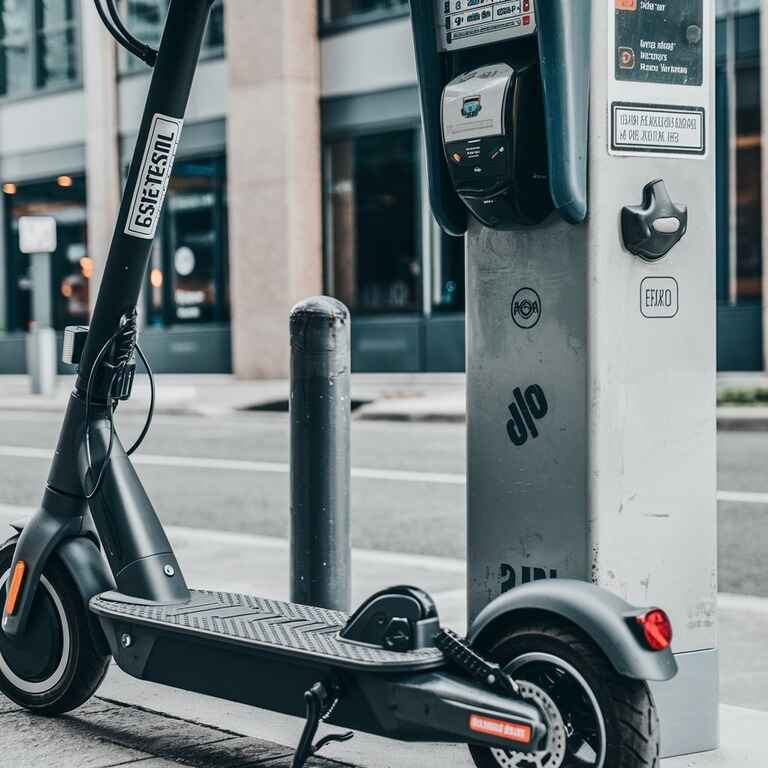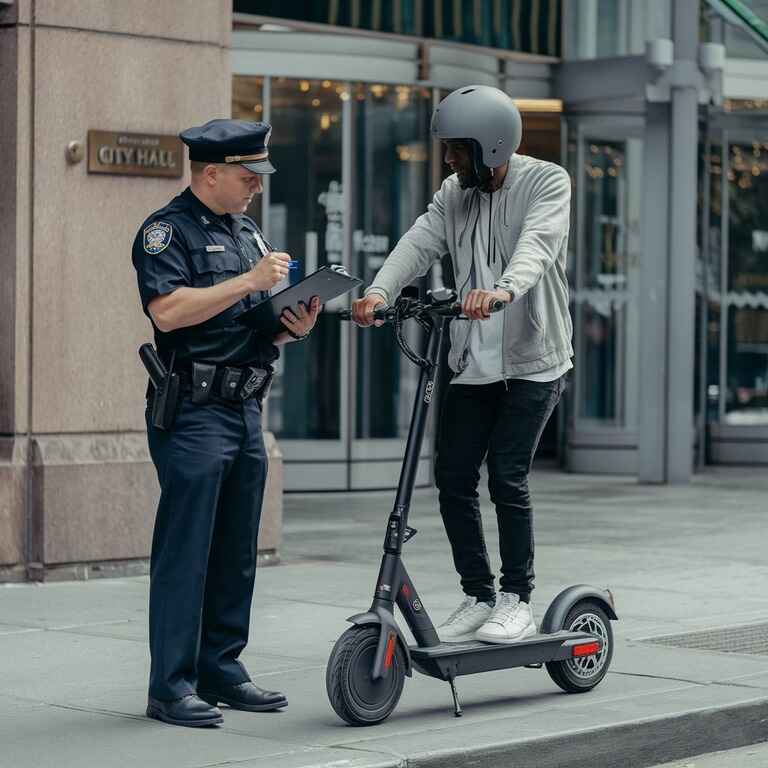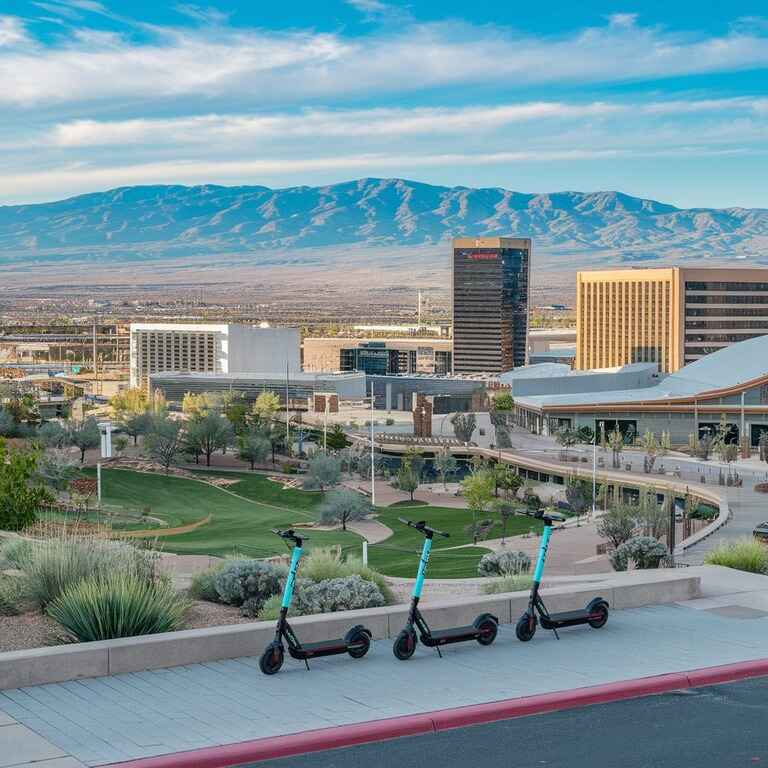Electric scooters have become an increasingly popular mode of transportation in Nevada, offering a convenient, eco-friendly way to travel short distances. However, to ensure the safety of riders and pedestrians, Nevada has implemented specific laws governing electric scooters. Understanding these regulations is essential for anyone who wants to ride legally and responsibly in the state.
This article provides a comprehensive guide to Nevada electric scooter laws, covering everything from age and licensing requirements to safety regulations and traffic rules.

 Who Can Ride Electric Scooters in Nevada
Who Can Ride Electric Scooters in Nevada
Minimum Age Requirements
In Nevada, riders must meet a minimum age requirement to operate an electric scooter legally:
- Riders must generally be at least 16 years old, though this can vary by local ordinance.
- Some rental companies may impose stricter age restrictions, requiring riders to be at least 18 years old.
Licensing and Identification Requirements
Are Driver’s Licenses Required?
Nevada does not require a driver’s license to operate a standard electric scooter. However, riders must be aware of the following:
- A valid driver’s license or learner’s permit may be required for high-powered scooters exceeding state speed or motor size limits.
Alternative Forms of Identification
For rental scooters, companies may request a government-issued ID to verify a rider’s age.
- Passports or state IDs can be alternatives if a driver’s license is unavailable.
Restrictions for Minors
Minors are subject to additional restrictions in Nevada:
- Riders under 18 years old may need parental consent to use rental scooters.
- Helmets are often required for minors, even if not mandatory for adult riders.
Where Electric Scooters Are Allowed in Nevada
Legal Areas for Riding Scooters
Streets and Bike Lanes
Electric scooters are typically allowed on streets with a speed limit of 35 mph or less.
- Riders are encouraged to use bike lanes when available for added safety.
Sidewalks and Pedestrian Zones
- Nevada generally prohibits riding electric scooters on sidewalks to protect pedestrians.
- In pedestrian zones, riders may need to dismount and walk their scooters.
Prohibited Areas for Scooter Use
Electric scooters are not allowed in the following locations:
- Highways or streets with speed limits above 35 mph.
- Certain parks or private properties where scooter usage is explicitly restricted.
Rules for Scooter Parking
Riders must park scooters responsibly to avoid fines or impounding:
- Scooters should not block sidewalks, crosswalks, or building entrances.
- Designated scooter parking zones should be used whenever possible.

Speed and Performance Restrictions
Maximum Speed Limits for Electric Scooters
Nevada law limits the speed of electric scooters to a maximum of 20 mph.
- Riders must adhere to local speed restrictions, which may be lower in congested areas or pedestrian zones.
Power and Motor Size Limitations
Electric scooters in Nevada must meet the following specifications:
- Motor size is generally capped at 750 watts for standard usage.
- High-powered scooters exceeding this limit may be classified differently and subject to additional regulations.
Exceptions for Certain Types of Scooters
Certain exceptions apply to specialized scooters:
- Scooters designed for medical or disability use may have different speed or motor restrictions.
- Local ordinances may allow higher-speed scooters in designated areas.
Safety Regulations for Electric Scooters in Nevada
Safety is one of the most critical aspects of riding an electric scooter. Nevada has specific rules to ensure riders and others stay protected. Here’s what you need to know about staying safe and legal while using an electric scooter in the state.
Helmet Requirements
Are Helmets Mandatory for All Riders?
Helmets are not legally required for riders over 18 in Nevada. However, wearing one is highly recommended, as it dramatically reduces the risk of head injuries in an accident.
Helmets are often mandatory for riders under 18, mainly if they operate a rental scooter or ride in areas with local ordinances that enforce stricter safety rules.
Helmet Standards and Recommendations
When choosing a helmet, look for one that meets recognized safety standards, such as:
- CPSC (Consumer Product Safety Commission) certification.
- A snug fit that covers the forehead and doesn’t tilt backward.
- Adequate ventilation for comfort during hot weather.
Many scooter rental companies provide helmets for their users, but bringing your own ensures a proper fit and hygiene.
Lighting and Reflectors
Front and Rear Lighting Requirements
Electric scooters must be equipped with a white light on the front that is visible from at least 500 feet. This helps riders stay visible to vehicles and pedestrians at night.
Scooters also need a red reflector or light on the back that can be seen from 300 feet away.
Reflective Gear for Night Riding
Nevada law encourages riders to wear reflective clothing or gear during low-light conditions. Reflective vests, armbands, or strips on backpacks can significantly increase your visibility to others.
Brake and Equipment Standards
Nevada requires electric scooters to have functional brakes capable of bringing the scooter to a safe and controlled stop. Before riding, check:
- The brake levers to ensure they’re responsive.
- The brake pads are for wear and tear.
- Whether your scooter has additional safety features like a bell or horn to alert pedestrians.

Traffic Rules and Rider Responsibilities
Riding an electric scooter is not just about having fun; it’s about sharing the road responsibly with others. Riders in Nevada must follow traffic laws to avoid fines or accidents.
Adherence to Nevada Traffic Laws
Electric scooter riders are required to follow the same traffic rules as bicycles:
- Stop at red lights and stop signs.
- Yield to pedestrians at crosswalks.
- Travel in the same direction as traffic when riding on the road.
Scooter riders are also prohibited from weaving between cars, as this poses a safety risk.
Right-of-Way Guidelines for Scooter Riders
When on the road or in bike lanes, scooters must yield the right-of-way to:
- Pedestrians in crosswalks or on sidewalks.
- Bicyclists, if riding in shared spaces where bikes have priority.
In bike lanes, ride single-file to avoid obstructing other cyclists.
Signaling and Hand Gestures for Turns
Nevada scooter riders must signal their intentions to turn or stop using precise hand gestures:
- Left turn: Extend your left arm straight out.
- Right turn: Extend your left arm upward or your right arm straight out.
- Stop or slow down: Extend your left arm downward.
Signaling ensures other road users know what you’re doing, reducing the risk of collisions.
Avoiding Distracted Riding
Distracted riding is a leading cause of scooter accidents. To stay safe:
- Avoid using your phone while riding. Pull over if you need to check directions or take a call.
- Don’t wear headphones or earbuds that block ambient sounds. You need to hear approaching cars and other riders.
DUI and Electric Scooters in Nevada
You may think DUI laws only apply to cars, but that’s untrue. In Nevada, riding an electric scooter under the influence is a serious offense.
Can You Get a DUI on an Electric Scooter?
Yes, you absolutely can. Electric scooters are considered vehicles under Nevada law, meaning DUI regulations apply to scooter riders like car drivers.
Blood Alcohol Concentration (BAC) Limits for Scooter Riders
The legal BAC limit for scooter riders is 0.08% for most adults, just like for car drivers. However, stricter limits apply to:
- Commercial vehicle operators (0.04%).
- Riders under 21 years old (0.02%).
Consequences of Riding Under the Influence
Riding an electric scooter while intoxicated can lead to:
- Fines range from $400 to $1,000 for a first offense.
- Possible jail time.
- Required attendance in DUI school or substance abuse programs.
- A suspension of your driver’s license or other penalties affecting your driving record.
Even if it’s “just a scooter,” impaired riding puts you and others at risk. Always plan a safe way to get home if you’ve been drinking.

Registration and Insurance Requirements
Electric scooters are generally considered lightweight, personal vehicles, making them easier to use than cars or motorcycles. But what about registration and insurance? Here’s what Nevada law says about these topics.
Is Registration Required for Electric Scooters?
In Nevada, electric scooters do not need to be registered with the DMV. This applies to most scooters that meet the state’s definition of a low-speed electric vehicle.
However, scooters that exceed Nevada’s speed or motor power limits may fall into a different vehicle category, like mopeds or motorcycles. These scooters may require:
- Registration with the DMV.
- License plates and a valid driver’s license for operation.
Before buying or operating a high-powered scooter, check the specific classification to ensure compliance with the law.
Insurance Requirements for Personal and Rental Scooters
Personal Scooters
Nevada does not require insurance for privately owned electric scooters. However, getting insurance can still be a good idea, especially if you frequently ride in busy areas. Scooter insurance typically covers the following:
- Liability for accidents where you’re at fault.
- Damage to your scooter from collisions or theft.
- Medical costs in case of injury.
Rental Scooters
Rental companies usually carry liability insurance that covers accidents involving their scooters. But this coverage may be limited to damages caused to others, leaving you responsible for your medical bills or scooter damage.
- Some rental services offer additional insurance as part of their app.
- Always review the terms and conditions before you ride.
Electric Scooter Rentals in Nevada
If you don’t own a scooter, rentals are a convenient option. Companies like Bird, Lime, and Spin have made electric scooters accessible throughout Nevada’s major cities. But renting a scooter comes with its own set of rules.
Overview of Rental Companies Operating in Nevada
Several rental companies operate in popular areas like Las Vegas, Reno, and Henderson. They typically provide:
- Easy-to-use apps for locating and unlocking scooters.
- Hourly or per-minute pricing models.
- Discounts for frequent users or students.
Most scooters are dockless, meaning you can pick them up and drop them off anywhere within the designated service area.
Rules Specific to Rental Scooters
You must follow Nevada’s general laws when using a rental scooter. Additionally, rental companies may impose their own rules, such as:
- Age requirements (often 18 or older).
- Prohibited use on sidewalks or pedestrian-only zones.
- Restrictions on parking outside designated zones (you could be charged a fee if you leave the scooter in the wrong place).
Liability and Rider Agreements for Rentals
Before your first ride, you must agree to the company’s terms and conditions. This contract usually includes:
- A waiver of liability for the rental company in case of an accident.
- Acknowledgment that you’ll follow all local laws and safety rules.
- Financial responsibility for any damage to the scooter during your ride.
Reviewing these terms carefully is a good idea, especially if you’re unsure what the insurance covers.

Penalties for Violating Electric Scooter Laws
Breaking the rules might seem like no big deal on a scooter, but Nevada takes violations seriously. Ignoring the law can lead to fines, penalties, or even impounding your scooter.
Fines and Citations for Common Infractions
If you violate electric scooter laws in Nevada, you could face:
- $50 to $100 fines for minor infractions, like riding on a sidewalk or parking improperly.
- Higher penalties for more serious violations include riding in restricted areas or speeding.
Scooter rental companies may also charge penalties through their apps for breaking their specific rules.
Legal Consequences for Repeat Offenses
Repeat offenses can lead to more severe consequences, including:
- Increased fines for subsequent violations.
- Possible suspension of your right to operate a scooter in certain areas.
- A tarnished driving record if the breach involves traffic laws.
Impact on Driving Records, If Applicable
Some scooter violations, like DUI offenses or running red lights, may be reported to the DMV and added to your driving record. This could affect your insurance rates or even lead to the suspension of your driver’s license.
Electric scooters are a unique category of vehicle. While they share similarities with bicycles, mopeds, and motorcycles, they’re governed by their own rules. Here’s how they compare to other cars under Nevada law.
Electric Scooters vs. Bicycles
Electric scooters and bicycles are often treated similarly under Nevada law, but there are key differences:
| Feature | Electric Scooters | Bicycles |
|---|---|---|
| Speed Limit | Maximum 20 mph | No specific speed limit, but must be safe |
| Licensing Required? | No | No |
| Sidewalk Riding | Generally prohibited | Allowed in some areas |
| Helmet Requirement | Often required for riders under 18 | Required for minors under 16 |
Both vehicles must follow traffic laws, but scooters are usually prohibited from sidewalks and pedestrian zones where bicycles may still be allowed.
Electric Scooters vs. Mopeds
Mopeds are motorized vehicles that are more powerful than electric scooters, so the rules are stricter:
| Feature | Electric Scooters | Mopeds |
|---|---|---|
| Maximum Speed | 20 mph | 30 mph |
| Registration Required? | No | Yes |
| Insurance Required? | No | Yes |
| License Plate Needed? | No | Yes |
Unlike scooters, mopeds require registration, insurance, and a valid driver’s license. Mopeds are also allowed to travel on roads with higher speed limits.
Electric Scooters vs. Motorcycles
Motorcycles are the most powerful of the three and have the most stringent requirements:
| Feature | Electric Scooters | Motorcycles |
|---|---|---|
| Maximum Speed | 20 mph | No limit |
| License Required? | No | Yes (motorcycle endorsement needed) |
| Insurance Required? | No | Yes |
| Helmet Required? | Generally for minors under 18 | Yes, for all riders |
Electric scooters are significantly less regulated, making them more accessible for casual riders. Motorcycles, on the other hand, require a full commitment to licensing, insurance, and safety gear.
Tips for Safely Riding Electric Scooters in Nevada
Riding an electric scooter is fun, but safety should always come first. Here are some practical tips to help you ride responsibly and avoid accidents.
Always Perform a Pre-Ride Check
Before every ride, inspect your scooter to make sure it’s in good condition. Check the following:
- Brakes: Ensure they’re responsive.
- Lights and reflectors: Make sure they’re functional, especially for night riding.
- Tires: Check for proper inflation and signs of wear.
- Battery level: Avoid running out of power mid-ride.
The company usually maintains rental scooters, but inspecting them before riding is still a good idea.
Wear the Right Gear
Protective gear can make all the difference in an accident. Here’s what to wear:
- Helmet: Choose one that fits snugly and meets safety standards.
- Reflective clothing: Helps you stay visible at night.
- Closed-toe shoes: Provide better grip and foot protection.
Follow Traffic Laws
Electric scooters must follow the same traffic rules as bicycles in Nevada. This means:
- Riding in bike lanes or on roads where scooters are permitted.
- Stopping at all stop signs and traffic lights.
- Yielding to pedestrians in crosswalks.
Riding predictably and obeying the rules keeps you safe and avoids fines.
Be Aware of Your Surroundings
Distracted riding can lead to accidents. Here’s how to stay alert:
- Avoid using your phone while riding.
- Keep both hands on the handlebars unless signaling.
- Watch for obstacles like potholes, debris, or parked cars.
Staying vigilant helps you react quickly to unexpected situations.
Plan Your Route
If you’re traveling in an unfamiliar area, plan your route before you ride. Look for:
- Streets with bike lanes or low-speed limits.
- Scooter-friendly areas without heavy vehicle traffic.
- Places to park your scooter legally and safely.
Taking a few extra minutes to plan can make your ride much smoother.

Local Ordinances and Variations Across Nevada
While Nevada has statewide laws for electric scooters, cities and counties can create rules. These local ordinances can vary depending on where you are. Knowing the differences is crucial to avoid fines or confusion.
Electric Scooter Laws in Las Vegas
Las Vegas is a hotspot for scooter rentals, especially on the Strip. The city has specific rules to manage traffic and pedestrian safety:
- Sidewalk Riding: Prohibited on the Las Vegas Strip. Scooters must stay in bike lanes or on roads with a speed limit of 35 mph or less.
- Parking Restrictions: Scooters must not block sidewalks, driveways, or business entrances. Designated parking zones are standard in busy areas.
- Rental Requirements: Riders must be at least 18 years old, and many rental companies require ID verification through their apps.
Las Vegas enforces strict penalties for violations, particularly in high-traffic areas like the Strip.
Electric Scooter Laws in Reno
Reno, with its college-town vibe, has embraced electric scooters but keeps a close eye on safety:
- Sidewalk Riding: Prohibited in downtown areas but allowed in residential zones unless otherwise posted.
- Speed Limits: Riders must not exceed 15 mph in busy zones, even if the scooter’s motor allows higher speeds.
- University Zones: The University of Nevada, Reno, has additional restrictions on where scooters can be ridden or parked on campus.
Reno often adjusts its ordinances based on community feedback, so it’s worth checking for updates if you’re a frequent rider.
Electric Scooter Laws in Smaller Cities
In smaller cities like Henderson or Carson City, scooter laws may be less strict but still enforce basic safety and traffic rules:
- Sidewalk Use: Often allowed but with caution. Riders must yield to pedestrians at all times.
- Parking Rules: Avoid blocking public spaces like bus stops, fire hydrants, or ADA ramps.
- Local Speed Limits: May vary but are generally capped at 20 mph.
Before riding in a new area, look for posted signs or check the local government’s website for specific guidelines.
Future Trends and Developments in Electric Scooter Regulations
The popularity of electric scooters is growing, and Nevada’s laws are evolving to keep up. As technology improves and more people adopt scooters, we can expect some changes in the future.
Emerging Technologies and Their Impact
Electric scooters are becoming more intelligent and safer. New features like advanced braking systems, built-in GPS, and automatic speed controls will likely influence future regulations.
For example:
- Geofencing: Some cities may require scooters to slow down or stop in restricted zones automatically.
- Collision Detection: Future scooters might include systems that warn riders of nearby hazards.
- Enhanced Battery Efficiency: Longer-lasting batteries could make scooters a more viable alternative for daily commutes, potentially leading to increased infrastructure like dedicated scooter lanes.
Environmental Considerations
Electric scooters are often promoted as eco-friendly alternatives to cars. Nevada may introduce incentives to encourage their use, such as:
- Subsidies for purchasing personal scooters.
- Expanded scooter-sharing programs in underserved areas.
- Investments in green infrastructure, like solar-powered charging stations for scooters.
Potential Legislative Changes
As electric scooters integrate into daily life, lawmakers may adjust regulations to address ongoing challenges. Some possible changes include:
- Stricter Licensing Requirements: For high-powered scooters that approach moped-like speeds.
- Mandatory Insurance: To cover accidents involving personal or rental scooters.
- Standardized Rules Across Cities: To simplify compliance for riders who travel between areas.
Keeping an eye on these developments can help riders stay ahead of the curve and prepare for new requirements.

Breaking It All Down
Understanding Nevada’s electric scooter laws is essential for riding safely and legally. Whether you own or rent a scooter, staying informed about rules like speed limits, parking restrictions, and local ordinances ensures a hassle-free experience.
Electric scooters are a convenient and eco-friendly way to travel. By following the laws, using available resources, and practicing safe riding habits, you can enjoy all the benefits scooters offer without trouble.
Keep an eye on emerging trends and changes to regulations as Nevada continues to adapt to this growing mode of transportation. And if you’re ever in doubt, contact local resources for guidance. Ride safe, and have fun exploring Nevada on two wheels!

Frequently Asked Questions
Do I need a driver's license to ride an electric scooter in Nevada?
No, you do not need a driver’s license to ride an electric scooter in Nevada as long as the scooter is classified as a low-speed vehicle (maximum speed of 20 mph). However, if your scooter meets the criteria for a moped or motorcycle (higher speed or motor power), you’ll need the appropriate license.
Can I ride an electric scooter on the sidewalk in Nevada?
In most parts of Nevada, riding electric scooters on sidewalks is prohibited, particularly in busy or pedestrian-heavy areas like the Las Vegas Strip. However, some smaller cities or residential areas may allow sidewalk riding. Always check local ordinances or look for posted signs indicating where scooters can be ridden.
Are helmets required when riding an electric scooter in Nevada?
While helmets are not required for riders over 18, they are recommended for safety. Helmets are mandatory for riders under 18 in Nevada. Some rental companies may provide helmets, or you can bring your own.
Can I park my electric scooter anywhere in Nevada?
No. Electric scooters should be parked in designated areas to avoid fines or penalties. Parking restrictions apply in high-traffic areas like the Las Vegas Strip, where scooters should not block sidewalks, doorways, or fire hydrants. Always follow the local parking rules.
What are the speed limits for electric scooters in Nevada?
Electric scooters are generally limited to a maximum speed of 20 mph in Nevada. Local ordinances may impose additional speed restrictions in busy areas in some cities, like Reno or Las Vegas. Always follow posted signs and be mindful of your surroundings.
Do I need insurance for my electric scooter?
Insurance is not required for personal electric scooters in Nevada. However, the rental company typically carries liability insurance if you’re riding a rental scooter. You can purchase private insurance for added coverage if you want to protect yourself and your scooter.
What happens if I break the law while riding an electric scooter?
If you violate electric scooter laws, you could face fines or penalties. Minor infractions, like riding on the sidewalk or parking improperly, can result in penalties ranging from $50 to $100. More serious violations, such as riding in restricted areas or speeding, may result in higher fines or the impoundment of your scooter.
Can I ride an electric scooter at night in Nevada?
Yes, you can ride at night but must ensure your scooter has working lights and reflectors. Some cities, like Las Vegas, may have specific lighting requirements for nighttime riding. Always make sure you’re visible to other drivers and pedestrians.
Are there any age restrictions for riding electric scooters in Nevada?
While no state-wide age restrictions exist for riding electric scooters, most rental companies require riders to be at least 18 years old. Some local ordinances may have additional rules regarding age. Always check with the scooter rental service or regional guidelines.
Will the laws change in the future?
As electric scooters become more popular, Nevada is likely to adjust its laws. Future changes could include stricter speed limits, new helmet regulations, or additional infrastructure like dedicated scooter lanes. Stay updated by checking local resources or government websites.

Additional Resources for You from The Rosenblum Allen Law Firm.
- Las Vegas DUI Lawyer: Our Las Vegas DUI attorneys offer skilled legal defense for those facing DUI charges.
- DUI Consequences: Understand the serious consequences of a DUI conviction in Nevada, including fines, license suspension, and more.
- DUI License Suspension: Find out what to expect if your driver’s license is suspended following a DUI arrest in Nevada.
- DUI Plea Bargain: Explore your options for negotiating a DUI plea bargain with the help of an experienced attorney.
- Drug DUI: Get insights into how drug-related DUIs are handled in Nevada and how you can defend against them.
- DUI Defense Strategies: Learn about various defense strategies for contesting DUI charges in Nevada.
- First Time DUI: If you’re facing a first-time DUI charge, here’s what you need to know about your defense options and potential consequences.
- Second Time DUI: A second DUI charge comes with more severe penalties. Find out how an experienced attorney can help.
- Marijuana DUI: Facing a DUI charge for marijuana use? This page outlines the specifics of marijuana-related DUIs in Nevada.
- Nevada DUI Law: Comprehensive information about DUI laws in Nevada, including legal limits and penalties.
- Las Vegas Legal Alcohol Limit: Learn about the legal alcohol limits in Las Vegas and how they can affect your DUI case.
Each of these links will guide you through the intricacies of DUI laws in Nevada and provide experienced legal advice. If you ever find yourself in need of legal assistance, don’t hesitate to reach out to The Rosenblum Allen Law Firm for experienced support.

Offsite Resources for You
Here are seven offsite resources related to electric scooter laws and legal matters in Nevada that you may find useful:
- Nevada Department of Motor Vehicles (DMV): The official DMV website provides comprehensive information on vehicle laws and regulations in Nevada, including details on electric scooters.
- National Association of City Transportation Officials (NACTO): NACTO works to improve the quality of transportation and safety in cities across the U.S. They provide useful guides for electric scooter regulations and planning.
- Electric Scooter Guide: This site offers a wide range of resources for electric scooter riders, from reviews to safety tips and legal considerations by region.
- City of Las Vegas Official Website: Las Vegas city website with updates on local ordinances, including traffic rules, scooter regulations, and safety guidelines.
- Reno.gov: The City of Reno’s official website provides information on scooter laws, safety requirements, and transportation options within the city.
- The Institute for Transportation and Development Policy (ITDP): ITDP promotes sustainable transportation systems and often provides resources on scooter laws, infrastructure, and environmental benefits.
- Nevada Department of Transportation (NDOT): NDOT’s website covers all aspects of transportation in Nevada, including new rules for electric scooters, bike lanes, and more.
These websites provide valuable information that can further assist you in understanding electric scooter laws, safety, and transportation planning in Nevada.

A Special Message from Our Lead Attorney, Molly Rosenblum Allen, Esq

Thank you for taking the time to explore these resources. I hope you found the information helpful in understanding Nevada’s electric scooter laws. If you have any questions or need assistance with your situation, don’t hesitate to reach out. My team and I are here to help—give us a call at (702) 433-2889 to get the ball rolling. We’re ready to assist you every step of the way!




